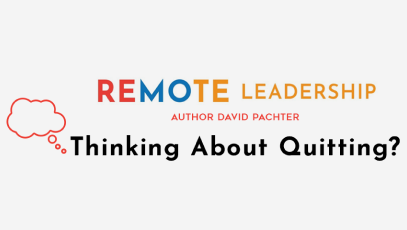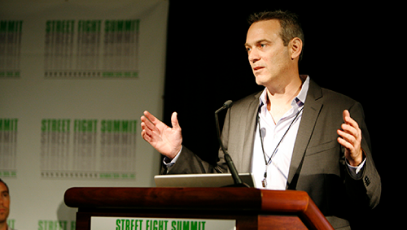Thinking about quitting? I get it. I had five jobs in three years at some point and at 28 I found myself still applying for entry-level jobs. As I did,some of you may be spending a good chunk of your work time looking for a new job.
Two things compelled me to stick with a job long enough to level up. The first was believing in the people or person I was working with and the second was when I decided to believe in myself, tapping into the important but at times elusive intrinsic motivation we all have. Intrinsic motivation compels us to do a job we don’t feel great about long enough to gain the expertise, trust, and recognition required to level up to something better.
When I shared these thoughts with my millennial colleague Stephanie Jules, she thoughtfully shared her generation’s side of the story:
“I recently had a conversation with a group of friends, women in their late 20s, early 30s. Out of 15 women, 7 were looking for new jobs. The reason? They just weren’t happy, and they wanted to try something new, they felt stuck at work and uninspired. Their chosen careers projected an image of success and yet, they were finding that success without fulfillment isn’t all that it’s cracked up to be.
I’m talking about a lawyer who was leaving her firm to try her hand at baking because the stress and fatigue became too much, and now she just wants to wake up and feel something different, something better. I was thinking about her student loans and just about fainted when she told me, but it made sense.
The reality for many millennials is different from that of previous generations — we can’t buy houses until we’re 40, and that’s if we’re lucky or married with a dual income, let’s not forget to add we’ve somehow managed to survive the crippling debt college put us in. A huge chunk of us are never having kids — opting to raise plants instead. It seems that happiness is one of the main things we’re searching for now. Success is no longer measured by bank account balance alone, but by how you feel. We’re a generation of people who understand how emotionally stunted our parents are, how much they had to sacrifice chasing the idea of “success” and we’re determined to break that mold. Am I going to stay with a company for years where I don’t have any joy and the fulfillment I seek or am I going to take a risk and try out something new and different? I have a friend who worked at a corporate job for years, an Ivy League graduate, and he started selling cars on the side for fun. It was something he had been passionate about and he ended up being great at it. Once things started picking up he decided to quit his job, and now does his car work full-time. Ask him if this gig will last forever and he has no clue. His wife works full time, they have no kids and don’t plan on having any, so being happy outweighs the “benefits” of the conventional 9-5 for him right now, and he’s created a life where that is possible.
If a job isn’t feeding you spiritually, if you’re miserable daily or feel undervalued or just uninspired, why stay? Why give another 5 years of your life to a place you don’t enjoy? Are there risks involved in leaving? Absolutely. The real question is, do we care when people whose lives we don’t aspire to replicate spell out the perceived consequences of life changes? Not really — not from what I’ve seen. Sure, the grass isn’t always greener but maybe I’m fueled by the idea that it is, maybe it’s worth finding out on my own. What can a company tell me or show me that makes me see things differently? How is staying beneficial to me? Is there a middle ground? Are companies investing in their employees’ hobbies and wants? Are they creating opportunities to grow and long-term incentives to stay? I’m sure many others of my generation, aren’t going to leave a well paying job because we aren’t happy 100% of the time, that’s not realistic; but are organizations concerned about our happiness at all? Maybe those visions align somehow, or maybe we can work together while it’s mutually beneficial.
On the AppleTV show “Ted Lasso”, Roy told Keeley, in a moment when she felt bad for leaving a job that changed her life, that every great mentor or leader expects and encourages their mentees to leave and move on eventually — the goal isn’t committing people to a life you may see as successful within your organization; rather, it’s understanding your team members as individuals, understanding their goals and working together to achieve them. I never take a job thinking ‘This is it for life!’ I think, ‘This is a great stepping stone, let’s see what I learn and where it takes me.’ Being a leader is about guiding teams and creating great contributors, but it’s also about being adaptable and flexible — so how are companies building up individuals who maybe crave something different? Are they even trying to? Or are they highlighting a path they decide is right and allowing great team members to leave due to the inflexibility of the organization?
People are leaning into their self-worth and holding themselves and their wants in high regard. It may be foolish to some, but I see it as the new normal and it’s a reality I’m excited to explore. What I find foolish are organizations and team leaders who think this is a trend.”
What are the conversations that should be happening now between managers and individual contributors? Where are the blind spots? And how can leaders better connect with those coming up now? Are you willing to share what you think?
David Pachter is the co-founder of JumpCrew, a fast-growing outsourced sales and marketing company based in Nashville, TN. He’s also the author of Remote Leadership: How to Accelerate Achievement and Create a Community in a Work-from-Home World published in fall 2021 from Amplify Publishing.



